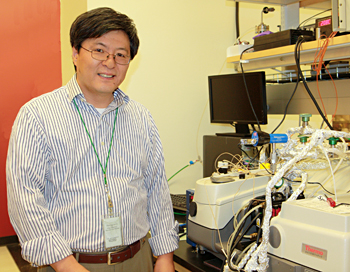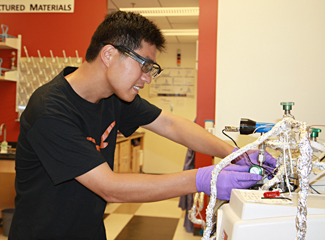 |
| November 27, 2012 | Volume 08 Issue 44 |
Designfax weekly eMagazine
Archives
Partners
Manufacturing Center
Product Spotlight
Modern Applications News
Metalworking Ideas For
Today's Job Shops
Tooling and Production
Strategies for large
metalworking plants
New discovery may yield cheaper, more efficient alternative to platinum for cleaner-running diesel engines

Dr. Kyeongjiae "K.J." Cho, professor of materials science and engineering and physics at UT Dallas, says platinum is too scarce and expensive to be a long-term answer to diesel's pollution problems.
Engineers at a company co-founded by a University of Texas at Dallas professor have identified a material that can reduce the pollution produced by vehicles that run on diesel fuel.
The material, from a family of minerals called oxides, could replace platinum, a rare and expensive metal that is currently used in diesel engines to try to control the amount of pollution released into the air.
In a study published in the August 17 issue of Science, Dr. Kyeongjae "K.J." Cho, professor of materials science and engineering and physics at UT Dallas, and others, found that when a man-made version of the oxide mullite replaces platinum, pollution is up to 45% lower than with platinum catalysts.
"Many pollution-control and renewable-energy applications require precious metals that are limited -- there isn't enough platinum to supply the millions and millions of automobiles driven in the world," says Cho, a senior author of the study and co-founder of the company Nanostellar. "Mullite is not only easier to produce than platinum, but also better at reducing pollution in diesel engines."
For the environmentally conscious, the higher fuel efficiency of diesel engines makes an attractive alternative to engines that run on gasoline. On the flip side, compared with gasoline engines, diesel vehicles produce more nitric oxide (NO) and nitrogen dioxide (NO2), which are known as NOx pollutants.

Dr. Weichao Wang, who earned his PhD from UT Dallas in 2011, was part of the research team.
In June, the World Health Organization upgraded the classification of diesel engine exhaust as carcinogenic in humans, putting it in the same category as cigarette smoke and asbestos. Countries throughout the world have drafted guidelines to reduce diesel air pollution in the next decade.
Platinum, because of its high expense to mine and limited supply, is considered a precious metal. Estimates suggest that for every 10 tons of platinum ore mined, only about 1 oz of usable platinum is produced.
In 2003, Cho became a co-founder and lead scientist at Nanostellar, a company created to find catalysts through a material design that would replace platinum in reducing diesel exhaust (carbon monoxide, or CO, and NOx pollutants). His company has designed and commercialized a platinum-gold alloy catalyst that is a viable alternative to platinum alone, but until this experiment with mullite, it had not found a catalyst made of materials that are less expensive to produce.
Cho, also a visiting professor at Seoul National University in South Korea, and his team suspected that the oxygen-based composition of mullite, originally found off the Isle of Mull in Scotland, might prove to be a suitable alternative. His team synthesized mullite and used advanced computer modeling techniques to analyze how different forms of the mineral interacted with oxygen and NOx. After computer modeling confirmed the efficiency of mullite to consume NOx, researchers used the oxide catalyst to replace platinum in diesel engine experiments.
"Our goal to move completely away from precious metals and replace them with oxides that can be seen commonly in the environment has been achieved," Dr. Cho says. "We've found new possibilities to create renewable, clean-energy technology by designing new functional materials without being limited by the supply of precious metals."
The mullite alternative is being commercialized under the trademark name Noxicat. Dr. Cho and his team will also explore other applications for mullite, such as fuel cells.
Dr. Weichao Wang, who earned his PhD in materials science and engineering in 2011 under Dr. Cho's supervision in Erik Jonsson School of Engineering and Computer Science at UT Dallas, was lead author of this study. Researchers from the University of Kentucky and Huazhong University of Science and Technology in China were also involved in this work.
The study was supported by the Texas Advanced Computing Center, Nanostellar, and the National Research Foundation of South Korea.
Source: UT Dallas
Published November 2012
Rate this article
View our terms of use and privacy policy
